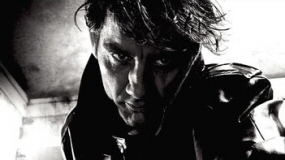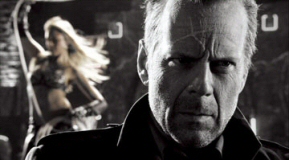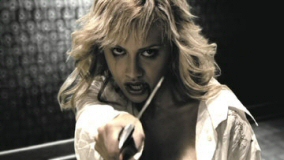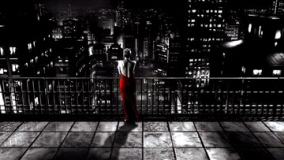Sin City (Robert Rodriguez & Frank Miller, 2005)
 With much hype, and a possibly
unprecedented division of directorial credit, Robert Rodriguez’ adaptation of
Frank Miller’s comic book Sin City arrives on screen in a form that
bears more resemblance to its source material than anyone might have guessed. In
predictable Hollywood form, it makes the translation from the page with toned
down sexual content and inflated violence, but largely the feel of the projects
is identical. Starting by using Miller’s published books as storyboards,
Rodriquez tries to convert the look and feel of the comic medium directly to film, and in doing so engages in
a hopelessly reductive game that places fidelity above cinematic virtue.
Incessant voiceovers, the nonstop musical score, and the totalitarian visual
programming conspire make a movie that’s been so thoroughly processed, so free
of spontaneity, that it’s impossible to find much pleasure in watching it.
Nothing breathes here. No moment seems to progress emotionally from another.
Individual scenes hold together, but they feel, like their printed counterparts,
trapped in a border that separates them from the whole. There’s little room
for interpretation in this hermetic universe, and the audience member can either
absorb it all like a sponge or be shut out from it completely. Unfortunately, my
experience was the latter one.
With much hype, and a possibly
unprecedented division of directorial credit, Robert Rodriguez’ adaptation of
Frank Miller’s comic book Sin City arrives on screen in a form that
bears more resemblance to its source material than anyone might have guessed. In
predictable Hollywood form, it makes the translation from the page with toned
down sexual content and inflated violence, but largely the feel of the projects
is identical. Starting by using Miller’s published books as storyboards,
Rodriquez tries to convert the look and feel of the comic medium directly to film, and in doing so engages in
a hopelessly reductive game that places fidelity above cinematic virtue.
Incessant voiceovers, the nonstop musical score, and the totalitarian visual
programming conspire make a movie that’s been so thoroughly processed, so free
of spontaneity, that it’s impossible to find much pleasure in watching it.
Nothing breathes here. No moment seems to progress emotionally from another.
Individual scenes hold together, but they feel, like their printed counterparts,
trapped in a border that separates them from the whole. There’s little room
for interpretation in this hermetic universe, and the audience member can either
absorb it all like a sponge or be shut out from it completely. Unfortunately, my
experience was the latter one.
 An anthology of three tawdry revenge
tales, each featuring a man under the influence who kills in a woman’s name, Sin
City hardly tries to be original. The three stories recycle and amplify stock
noir plots, to no apparent end. Rodriguez inflates the fatalism inherent in noir
to comic proportions here, yet still expects us to find it “cool”. The film
is a parade of deaths that are frequently neither cool, nor funny. Above all
else, they’re never mourned. Life’s cheapness in this world is
supposed to give us a giddy thrill, but such an exercise in juvenile cynicism
ends up cheapening the characters more than anything. With nothing
at stake, comedy becomes the movie’s only reason for being, and it’s simply
not as funny as it seems to think it is (the overcooked noir narration is
particularly strained). Perhaps the most egregious sequence invokes the church
in an attempt to make us giggle at its nastiness. The joke falls flat, however,
and the only result is a bad taste in one’s mouth.
An anthology of three tawdry revenge
tales, each featuring a man under the influence who kills in a woman’s name, Sin
City hardly tries to be original. The three stories recycle and amplify stock
noir plots, to no apparent end. Rodriguez inflates the fatalism inherent in noir
to comic proportions here, yet still expects us to find it “cool”. The film
is a parade of deaths that are frequently neither cool, nor funny. Above all
else, they’re never mourned. Life’s cheapness in this world is
supposed to give us a giddy thrill, but such an exercise in juvenile cynicism
ends up cheapening the characters more than anything. With nothing
at stake, comedy becomes the movie’s only reason for being, and it’s simply
not as funny as it seems to think it is (the overcooked noir narration is
particularly strained). Perhaps the most egregious sequence invokes the church
in an attempt to make us giggle at its nastiness. The joke falls flat, however,
and the only result is a bad taste in one’s mouth.
 Somewhere between the
transfer from video, the high contrast black and white cinematography, and Rodriquez’s
hyperactive cutting, the projected film almost became physically nauseating for
me to watch at times, particularly during the hyperactive Mickey Rourke segment.
The movie's a visual workout, but the artifice of it all gets to be exasperating. Who can take interest in
anything when every arterial spray is so completely highlighted, yet so
meaningless? Rodriguez splashes color across his frame mostly when he wants to
ramp up the level of intensity, which makes the film’s black and white
aesthetic just feel like an arbitrary gimmick. Incidentally, the one scene made
by “special guest director” Quentin Tarantino bucks that trend, featuring a
flurry of color flashes that suggests the monochrome nature of Sin City is just
a state of mind.
Somewhere between the
transfer from video, the high contrast black and white cinematography, and Rodriquez’s
hyperactive cutting, the projected film almost became physically nauseating for
me to watch at times, particularly during the hyperactive Mickey Rourke segment.
The movie's a visual workout, but the artifice of it all gets to be exasperating. Who can take interest in
anything when every arterial spray is so completely highlighted, yet so
meaningless? Rodriguez splashes color across his frame mostly when he wants to
ramp up the level of intensity, which makes the film’s black and white
aesthetic just feel like an arbitrary gimmick. Incidentally, the one scene made
by “special guest director” Quentin Tarantino bucks that trend, featuring a
flurry of color flashes that suggests the monochrome nature of Sin City is just
a state of mind.
 Sin City's noir
trappings are just empty attitude. It walks the walk and talks the talk, but
feels slavishly devoted to its source for devotion’s sake. For all of its
bluescreen wizardry, it fails to generate any atmosphere. From first time CGI fog
rolls across the screen, it reveals itself as a sham. Given the circumstances,
it’s not
surprising that the cast is essentially reduced to a series of models.
Laughable performances abound (the troupe of singularly unsexy strippers are
universally awful). The majority of the actors can’t sell either their
dialogue or their outfit (each of which share equal importance in Sin City’s
scheme of things). Only Clive Owen gives what could be described as a good
performance. Mickey Rourke, struggling under a mountain of makeup effects, tries
valiantly but fails to capture even a smidgeon of the scuzzy charm he managed
to bring to the infinitely superior neo-noir Angel Heart. To bring up
other neo-noirs in comparison to Sin City’s meaningless action movie
histrionics almost seems an insult to them, but next to the striking, relevant
genre work of directors like John Dahl, Oliver Stone and Brian De Palma, this is
wholly inadequate.
Sin City's noir
trappings are just empty attitude. It walks the walk and talks the talk, but
feels slavishly devoted to its source for devotion’s sake. For all of its
bluescreen wizardry, it fails to generate any atmosphere. From first time CGI fog
rolls across the screen, it reveals itself as a sham. Given the circumstances,
it’s not
surprising that the cast is essentially reduced to a series of models.
Laughable performances abound (the troupe of singularly unsexy strippers are
universally awful). The majority of the actors can’t sell either their
dialogue or their outfit (each of which share equal importance in Sin City’s
scheme of things). Only Clive Owen gives what could be described as a good
performance. Mickey Rourke, struggling under a mountain of makeup effects, tries
valiantly but fails to capture even a smidgeon of the scuzzy charm he managed
to bring to the infinitely superior neo-noir Angel Heart. To bring up
other neo-noirs in comparison to Sin City’s meaningless action movie
histrionics almost seems an insult to them, but next to the striking, relevant
genre work of directors like John Dahl, Oliver Stone and Brian De Palma, this is
wholly inadequate.
34
05-08-05
Jeremy Heilman